Fifty years ago this month, we lost one of the greatest musicians of all time. Jimi Hendrix died in the Notting Hill area of London, on 18 September 1970.
Johnny Allen Hendrix was born on 27 November 1942 in Seattle. He became “Jimi” only later. He had a diverse lineage with African-American and Native American roots. His grandmother Nora was said to be one-quarter Cherokee. Early 20th-century photos reveal her fine features, which bear a striking resemblance to those of her grandson.
After a period in Canada, Hendrix returned to the United States. He picked up a broken ukulele in 1957 and taught himself to play, did a brief stint in the US military in the early 1960s, and flew to London with his new British manager, Chaz Chandler, in 1967. By 1969, Hendrix was the world’s highest-paid rock musician, with hits such as Voodoo Child, Purple Haze, and Hey Joe under his belt. He topped the bill at California’s Monterey Pop Festival in 1967 and at Woodstock in 1969. Just one year later, he was dead.
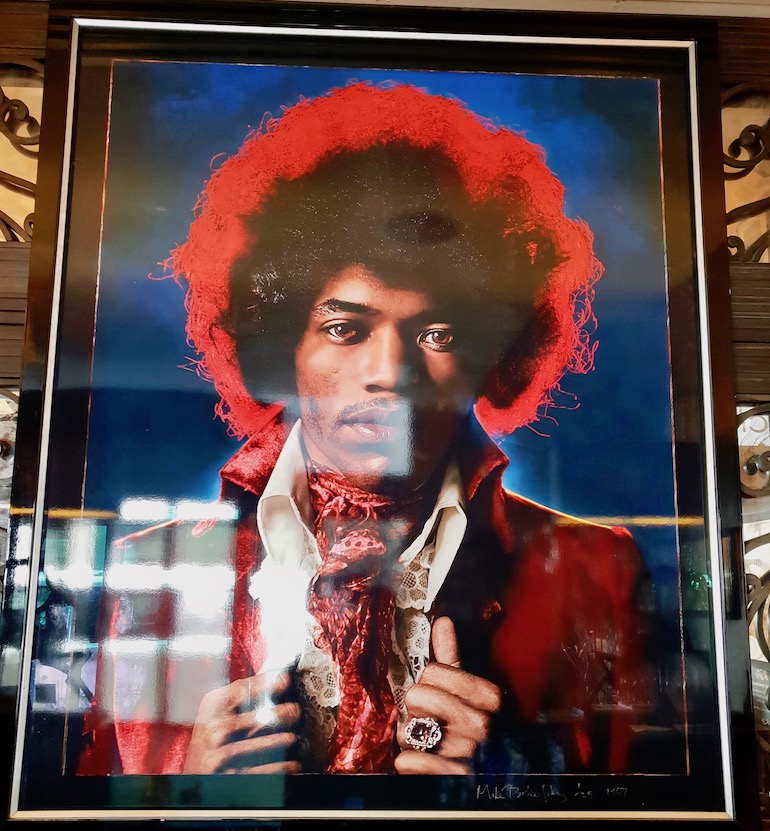 Jimi Hendrix photo at Sanctum Soho Hotel. Photo Credit: © Ursula Petula Barzey.
Jimi Hendrix photo at Sanctum Soho Hotel. Photo Credit: © Ursula Petula Barzey.
Hendrix and Handel
Jimi’s story is told at 23-25 Brook Street, at Handel & Hendrix in London’s well-appointed Mayfair area. You can have a peek behind the scenes on the house’s virtual tour, here. The flat was previously the home of Baroque musician George Frideric Handel. He was the property’s first resident, moving in during 1723 and living there for 36 years. Jimi, by comparison, stayed there less than a year. Records show Handel paid an annual rent of £50 in the 1740s. Regarded as the greatest composer of his age, Handel wrote Messiah and Water Music. In 1727 he wrote Zadok the Priest, one of four coronation anthems for King George II. The music is still used at our coronations.
It’s said that Hendrix used to listen to and enjoy Handel’s music. Perhaps he felt a bond with the German-born musician, who like Hendrix found celebrity and success in a foreign land. Despite its Mayfair location, the former home of Handel and Hendrix is relatively modest, but it’s full of rare treasures for Hendrix fans to enjoy, like his famously smashed-up guitar, a Fender Stratocaster. Jimi destroyed this as part of his electrifying stage act in the Royal Albert Hall in 1969.
An elemental force
Hendrix today seems to us like something of an elemental force. It may come as a surprise, then, to learn that he chose his home furnishings at John Lewis, the relatively staid department store on Oxford Street. It’s where many people buy their essentials and remains something of an institution – not very rock and roll, though.
In the `60s, London’s rock and roll aristocracy all knew each other. They lived in a tight-knit little world, sharing houses, tailors, lovers and much, much more besides. Jimi lived with girlfriend Kathy Etchingham at 34 Montagu Square. He wrote the The Wind Cries Mary here. His landlord was Ringo Starr. Paul McCartney was the previous tenant and wrote Eleanor Rigby here. John Lennon and Yoko Ono lived in the flat after Hendrix, attracting the unwelcome attentions of the drug squad in the process.
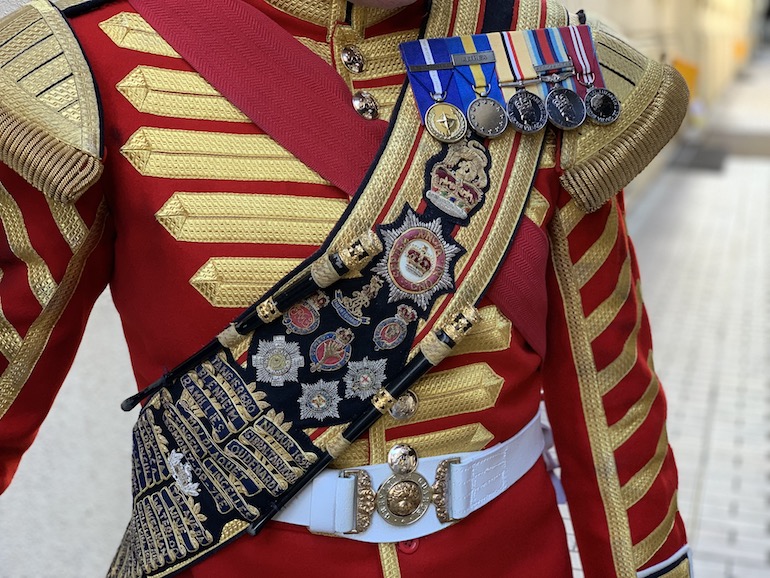 British Army jackets from the Victorian era. Photo Credit: © Antony Robbins.
British Army jackets from the Victorian era. Photo Credit: © Antony Robbins.
The London debut
There’s some argument about the location of Jimi’s first London gig. It probably depends on how you define it. Some say he played a private set at Scotch of St James on the night he flew to England, meeting Etchingham the same day. Others assert that the true honour belongs to the former Bag O’ Nails club in Soho, now The Court, an elegant members’ club. Music journalist Paul Du Noyer claims – in the pages of his 2010 book, In the City: A celebration of London Music – that Jimi’s first London set was at a club in the Charing Cross Road alongside Ginger Baker of Cream.
The UFO club on the Tottenham Court Road was a firm Hendrix favourite. It’s long gone now. Not so The Troubadour in Earls Court, which appears to be frozen in time – in a good way. It exudes boho appeal and is going strong after 60 years hosting musical greats like Bob Dylan, Paul Simon, The Strokes and Jimi Hendrix. The venue continues to host live music most nights and to this day attracts a crowd of would-be Beatniks. Hendrix’s final gig was in Soho’s (perhaps the world’s) most famous jazz club, Ronnie Scott’s.
Jimi in bohemia
Jimi loved London’s bohemian scene. He shopped for clothes in Soho’s Carnaby Street and in Notting Hill’s Portobello Market. Such was his taste for the exotic, the legend goes, that he’s responsible for introducing the ring-necked parakeet to England. It’s said he released two of the birds in Carnaby Street. There’s no evidence at all for this, but why let the truth get in the way of a good story?
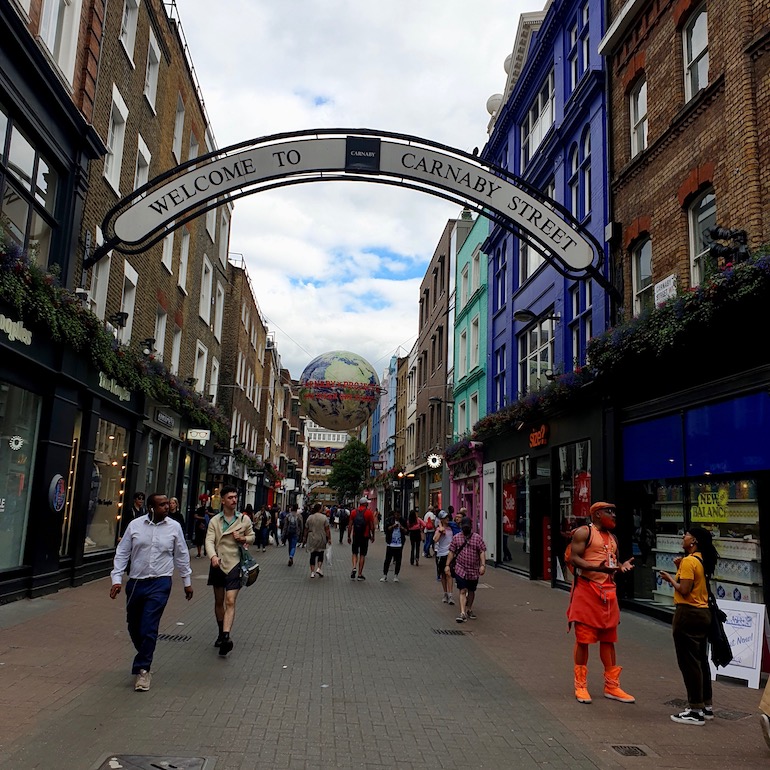 Carnaby Street in London. Photo Credit: © Ursula Petula Barzey.
Carnaby Street in London. Photo Credit: © Ursula Petula Barzey.
Checking out
What is true is that Jimi’s last London home was the Cumberland Hotel in Marble Arch. He liked hotels and valued this one’s anonymity in particular. But it was at the Samarkand Hotel, in Lansdowne Crescent, about two miles to the west in now-fashionable Notting Hill, that Hendrix would breathe his last, while at supper with a friend.
It was at Kensington’s now-demolished St. Mary Abbot’s Hospital that Jimi was officially declared dead. The exact circumstances are disputed to this day. He was attended by young Australian doctor John Bannister, who it’s said worked hard to save him. Although barbiturates and red wine were clearly involved in the death, it was declared an open verdict by Coroner Gavin Thurston.
Jimi Hendrix’s music was both unique and ahead of its time. His use of the electronic guitar, making a spectacular virtue of discordant feedback, was breathtaking. No doubt his musical style would have evolved as he continued to innovate. We can only speculate on what might have been had Jimi not died aged just 28 years old.
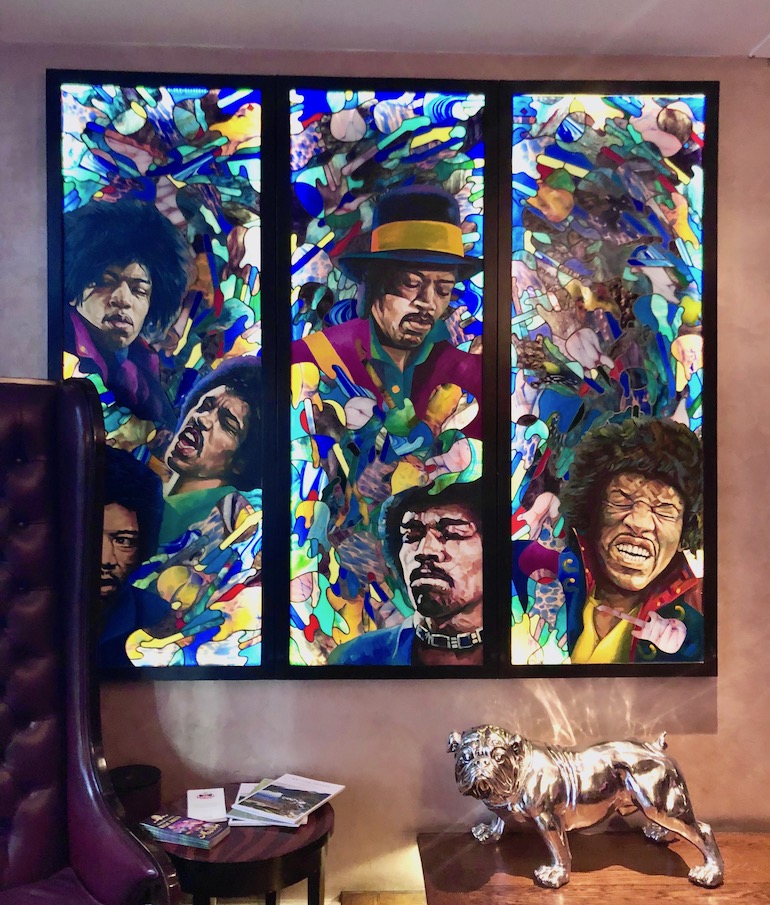 Jimi Hendrix inspired stained glass window in the reception at Sanctum Soho Hotel. Photo Credit: © Ursula Petula Barzey.
Jimi Hendrix inspired stained glass window in the reception at Sanctum Soho Hotel. Photo Credit: © Ursula Petula Barzey.



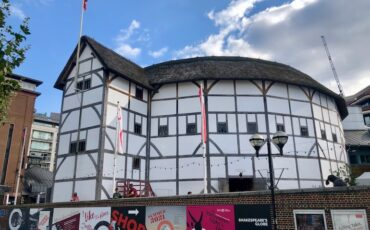
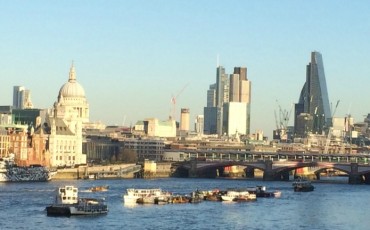

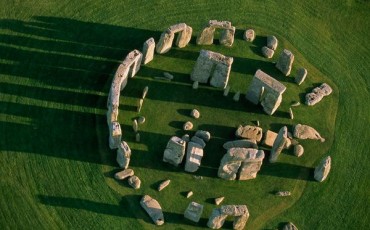
Leave a Reply